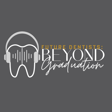
Navigating Transitions in Dentistry
About the Hosts:
Dr. Savanah Craig is a practicing dentist who co-hosts the "Beyond Graduation" podcast. She has made significant strides in the field of dentistry after completing her residency. Dr. Craig is noted for her attention to patient care and her adaptive approach to various transitions within her career.
Dr. Ronnetta Sartor is a seasoned dentist and co-host of the "Beyond Graduation" podcast. She has successfully transitioned from associateship to practice ownership and brings a wealth of experience in managing a dental practice and patient relationships. Dr. Sartor is known for her proactive nature and knowledge in dental transitions.
Episode Summary:
Welcome back to another enlightening episode of "Beyond Graduation" with Dr. Savanah Craig and Dr. Ronnetta Sartor. This week, our hosts dive into the inevitable yet intricate world of transitions, focusing particularly on dental careers. From the steps taken post-graduation to residency, moving states, and eventually practice ownership, this episode provides an in-depth look into navigating these crucial phases.
Dr. Savanah Craig and Dr. Ronnetta Sartor share their personal experiences with numerous transitions, including moving from dental school into residency and then into professional practice. They discuss the importance of establishing a reliable network within the dental community, particularly emphasizing the value of mentors and colleagues to smooth out these transitions. Dr. Craig highlights the constant need for strategic planning regarding vacation times and patient recalls, marking a significant shift from the academic schedule to professional practice.
Transitioning into an associateship or moving towards practice ownership brings its own set of challenges and rewards. Dr. Sartor recounts her journey of purchasing an existing practice, the role of a third-party broker, and the significance of inheriting a well-established team. Both dentists underline the importance of maintaining patient relationships during these phases and the benefits of having a supportive practice team. Throughout their dialogue, the duo takes into consideration the human aspect, recognizing that while transitions can be daunting, they are also opportunities for growth and development.
Key Takeaways:
- Navigating Career Transitions: Learn how to handle shifts from dental school to residency and professional practice.
- Importance of Community: Building a strong network within the dental community can significantly ease transition periods.
- Strategic Planning: The necessity of planning vacations and patient recalls, marking the shift from an academic to a professional schedule.
- Patient Relationships: Effectively managing patient relationships during transitions in care.
- Support Systems: The role of a supportive practice team and the significance of receiving a predecessor’s seal of approval.
Connect with Us:
- Savanah Craig, DDS: @savanahcraigdds
- Ronnetta Sartor, DMD: @dr_sartor
- FutureDentists Beyond Graduation: @futuredentistsbeyondgraduation
- Dental Residency Guide and Beyond Graduation eBooks: https://ignitedds.com/subscription-resources/
Embark on this journey with Dr. Craig and Dr. Sartor, and gain insightful tips to manage your own transitions in the dental profession. Don’t forget to tune into "Beyond Graduation" for more riveting discussions and expert advice on navigating life and career beyond dental school.



